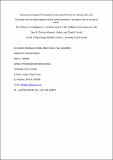Files in this item
The influence of intelligence on the endorsement of the intelligence–attractiveness halo
Item metadata
| dc.contributor.author | Talamas, Sean N. | |
| dc.contributor.author | Mavor, Kenneth I. | |
| dc.contributor.author | Perrett, David I. | |
| dc.date.accessioned | 2018-02-28T00:32:48Z | |
| dc.date.available | 2018-02-28T00:32:48Z | |
| dc.date.issued | 2016-06 | |
| dc.identifier | 241307876 | |
| dc.identifier | 8a655563-f867-4ae3-8667-438f1bde80c7 | |
| dc.identifier | 84959319549 | |
| dc.identifier | 000373549900030 | |
| dc.identifier.citation | Talamas , S N , Mavor , K I & Perrett , D I 2016 , ' The influence of intelligence on the endorsement of the intelligence–attractiveness halo ' , Personality and Individual Differences , vol. 95 , pp. 162 - 167 . https://doi.org/10.1016/j.paid.2016.02.053 | en |
| dc.identifier.issn | 0191-8869 | |
| dc.identifier.other | Bibtex: urn:b3515ad82d24816bc9194b68bdd42029 | |
| dc.identifier.other | ORCID: /0000-0002-3160-3889/work/60427966 | |
| dc.identifier.other | ORCID: /0000-0002-6025-0939/work/64360926 | |
| dc.identifier.uri | https://hdl.handle.net/10023/12811 | |
| dc.description.abstract | While some theories emphasize the influence of the ‘attractiveness halo’ on perceptions of intelligence, empirical evidence suggests that perceptions of attractiveness themselves can be influenced by perceptions of other desired traits such as intelligence. In an educational context, the effect of impressions of intelligence on teachers' expectations of students gives them particular significance. Research on kin selection and cognitive biases highlight the possibility that intelligent people endorse the intelligence–attractiveness relationship more strongly than less intelligent people. We investigated how a perceiver's intelligence can influence the association between perceived intelligence and attractiveness of others. We asked 126 participants to rate 48 children's faces for perceived intelligence and attractiveness and then asked them to complete the International Cognitive Ability Resource (ICAR) intelligence test. Ratings by participants who scored higher on the intelligence test showed a stronger relationship between perceptions of intelligence and attractiveness than participants who scored lower on the intelligence test. This effect was significant even after controlling for differences in participants' scale use. These findings, while preliminary, illuminate an individual difference that influences perceptions of intelligence with potentially concerning implications regarding expectancy effects in educational settings. | |
| dc.format.extent | 6 | |
| dc.format.extent | 449635 | |
| dc.language.iso | eng | |
| dc.relation.ispartof | Personality and Individual Differences | en |
| dc.subject | Attractiveness halo | en |
| dc.subject | Attractiveness | en |
| dc.subject | Bias | en |
| dc.subject | Perception | en |
| dc.subject | NDAS | en |
| dc.title | The influence of intelligence on the endorsement of the intelligence–attractiveness halo | en |
| dc.type | Journal article | en |
| dc.contributor.institution | University of St Andrews. School of Psychology and Neuroscience | en |
| dc.contributor.institution | University of St Andrews. Centre for Higher Education Research | en |
| dc.contributor.institution | University of St Andrews. Institute of Behavioural and Neural Sciences | en |
| dc.contributor.institution | University of St Andrews. Centre for Social Learning & Cognitive Evolution | en |
| dc.identifier.doi | https://doi.org/10.1016/j.paid.2016.02.053 | |
| dc.description.status | Peer reviewed | en |
| dc.date.embargoedUntil | 2018-02-27 |
This item appears in the following Collection(s)
Items in the St Andrews Research Repository are protected by copyright, with all rights reserved, unless otherwise indicated.

